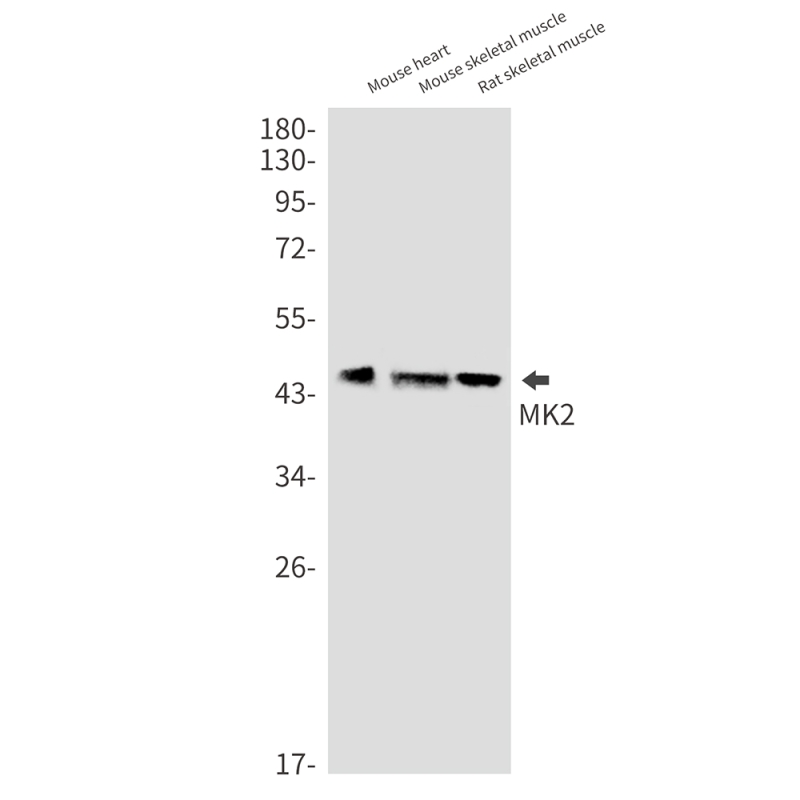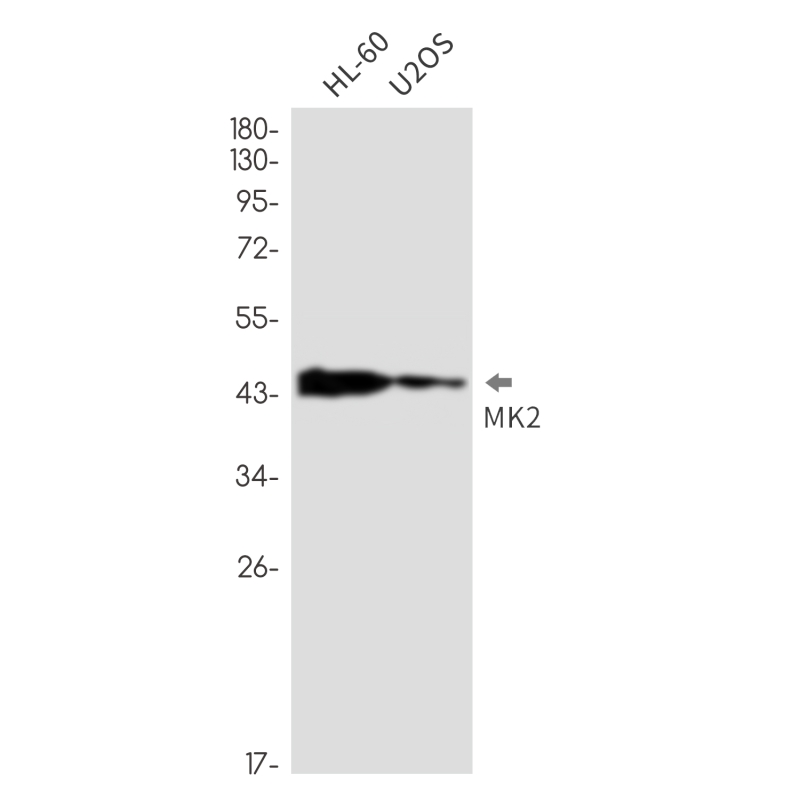

| WB | 1/500-1/1000 | Human,Mouse,Rat |
| IF | 1/20 | Human,Mouse,Rat |
| IHC | 咨询技术 | Human,Mouse,Rat |
| ICC | 技术咨询 | Human,Mouse,Rat |
| FCM | 咨询技术 | Human,Mouse,Rat |
| Elisa | 咨询技术 | Human,Mouse,Rat |
| Aliases | MAPKAPK2; MAP kinase-activated protein kinase 2; MAPK-activated protein kinase 2; MAPKAP kinase 2; MAPKAP-K2; MAPKAPK-2; MK-2; MK2 |
| Entrez GeneID | 9261 |
| WB Predicted band size | Calculated MW: 46 kDa; Observed MW: 46 kDa |
| Host/Isotype | Rabbit IgG |
| Antibody Type | Primary antibody |
| Storage | Store at 4°C short term. Aliquot and store at -20°C long term. Avoid freeze/thaw cycles. |
| Species Reactivity | Human,Mouse,Rat |
| Immunogen | A synthetic peptide of human MK2 |
| Formulation | Purified antibody in TBS with 0.05% sodium azide,0.05%BSA and 50% glycerol. |
+ +
1. **"MAPKAP kinase 2 is essential for LPS-induced TNF-α biosynthesis"** by Kotlyarov et al. (1999)
- 摘要:该研究通过使用MK2敲除小鼠,证明MAPKAPK2在调节TNF-α合成中的关键作用,抗体用于检测MK2蛋白表达及磷酸化状态。
2. **"Distinct functions of the mitogen-activated protein kinase-activated protein (MAPKAP) kinases MK2 and MK3"** by Ronkina et al. (2007)
- 摘要:比较MK2与MK3的功能差异,利用特异性抗体验证两者在炎症反应中的特异性信号通路调控机制。
3. **"Role of MK2 in post-transcriptional mechanisms governing the inflammatory response"** by Gaestel et al. (2009)
- 摘要:探讨MK2通过磷酸化下游mRNA结合蛋白调控炎症因子表达的机制,抗体用于免疫沉淀和细胞定位分析。
4. **"Selective inhibition of MAPKAP kinase 2 prevents cytokine production"** by Anderson et al. (2007)
- 摘要:开发MK2特异性抑制剂,使用抗体检测抑制后MK2活性变化,证明其作为抗炎治疗靶点的潜力。
(注:以上文献为示例,实际引用需核对原始文献信息。)
MAPKAP Kinase 2 (MK2), a serine/threonine kinase downstream of the p38 mitogen-activated protein kinase (MAPK) pathway, plays a critical role in cellular stress responses, inflammation, and cytokine regulation. Activated via p38-mediated phosphorylation under stimuli like osmotic stress, UV radiation, or inflammatory cytokines, MK2 modulates post-transcriptional gene expression by phosphorylating targets such as HSP27. CREB, and tristetraprolin (TTP), thereby influencing mRNA stability, translation, and cytoskeletal dynamics. Its involvement in inflammatory diseases, cancer progression, and ischemia-reperfusion injury makes it a key therapeutic target.
Antibodies targeting MK2 are essential tools for studying its expression, activation, and functional interactions. These antibodies, often raised in rabbits or mice, detect specific epitopes, including phosphorylated residues (e.g., Thr334) to assess activation status. Validated through techniques like Western blotting, immunoprecipitation, and immunofluorescence, they help delineate MK2's role in signaling cascades and disease models. Specificity is confirmed using knockout controls or recombinant proteins. Researchers employ MK2 antibodies to explore its dual role in pro-inflammatory signaling and cell survival, as well as its crosstalk with other pathways like NF-κB. Such studies advance drug discovery efforts, particularly in autoimmune disorders and cancer therapeutics, where MK2 inhibition is under investigation.
×